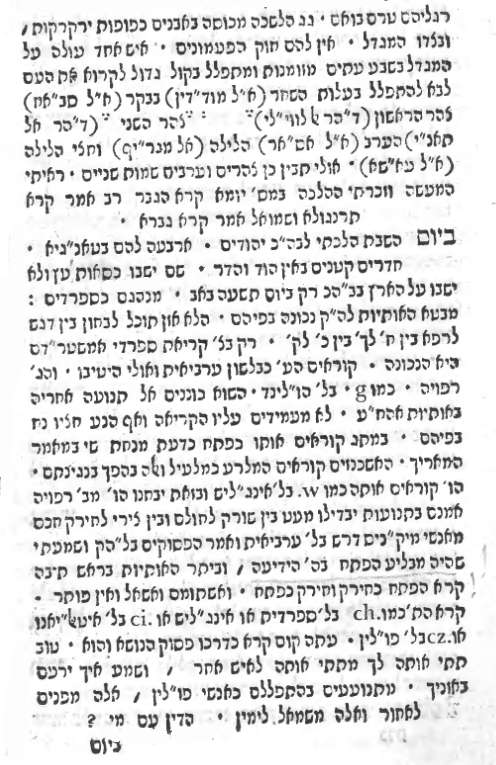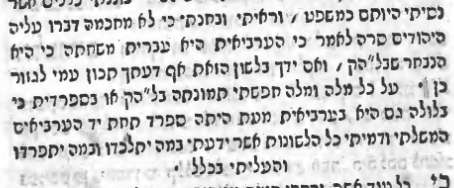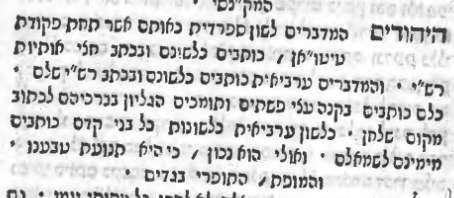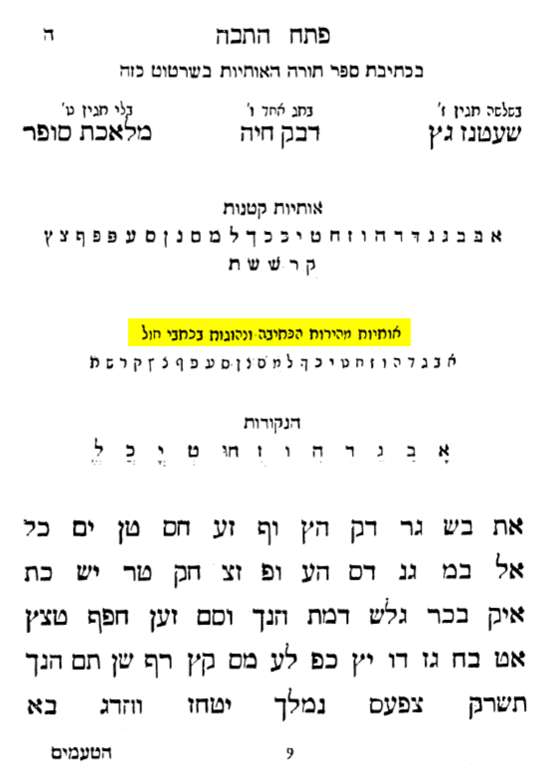Since the other day I posted about Naftali Herz Imber, whom someone compared to vagabond poet Samuel Romanelli (1757-1814), I thought I'd post some interesting things he wrote.
Romanelli was an Italian Jewish poet who spent several years in Morocco, and wrote a famous book about it cleverly called משא בערב (Berlin, 1792). On page 9 he has some interesting linguistic information about the Hebrew pronunciation of the Moroccan Jews.

He approves of their pronunciation of Hebrew consonants. They distinguish between dagesh and rafeh and between the letters ח and כ as well as כּ and ק. However, only in the case of צ are they outdone by the Amsterdam Sephardim. They pronounce the ע as in the Arabic, and Romanelli claims they might even outdo the Arabs. In addition, they pronounce ג (without dagesh) like a g in Dutch (kind of like a rolled r to this here American ear; hear it pronounced here).
He gives them mixed marks for their vowel pronunciation. With the letters אהח"ע the sheva is sounded with no stress. Even the sheva na, they barely pronounce. They pronounce the meseg like a patach, which accords with the view of the Minchas Shai. They make the same mistake as the Ashkenazim - pronouncing milael and milera the same - only with them its the opposite. They pronounce the ו like the letter w in English (which is interesting - see below), and this is what enables them to distinguish between ב and ו. Regarding vowels, they differentiate only slightly between shurek and cholem and between tzere and chirik.
He then digresses to discuss the rather odd pronunciation of one Chacham of the Jews of Meknes, whom he heard preach in Arabic, only quoting pesukim in the original Hebrew. Romanelli writes that he heard him only barely pronounce the patach under the heh hayediah. Regarding other letters, at the beginning of a word he would pronounce patach like a chirik and vice versa. Greatly surprised at this unsual pronounciation, he asked for an explanation and none could give one. R. writes that the Chacham pronounced the ת like ch in Spanish or English, or ci in Italian, or cz in Polish. (At first I thought that Romanelli is showing off here. I doubt he knew Polish; maybe he was trying to create the impression that he knows all these languages. But the truth is that he was multilingual and had a gift for picking up languages, so he is probably multiplying examples for a multi-national Jewish audience that he knows can read Hebrew - they are reading his book after all - but may only know the pronunciation of one of these languages. If so, he is simply helping out potential readers.)
Anyway, after noting that this rabbi pronounced the ת like the ch in China, Romanelli advises the reader: Go ahead and try to pronounce the verse he was sermonizing on - טוב תתי אותה לך מתתי אותה לאיש אחר - boy does that sound bad! Finally, Romanelli notes that they shockel (sway) when they pray, like Polish Jews; some from from front to back, others from left to right.
Extra points of interest: In Romanelli's travels he wound up in England for a time and therefore he knew English. In 1799 Romanelli published a book called "Grammatica ragionata Italiana ed Ebraica: con tratto, ed esempj di poesia." In light of his noting the pronunciation of w in English, see this quote which appears as a motto on the page after the title:

I'm not sure if that W got cut off in the scan, or if it's a V, in which case that's quite an archaism! Incidentally, in this same book he mentions his firsthand knowledge of the strange Moroccan pronunciation of ת, and contrasts it with the English th:"Nell'interno dell'Impero di Marocco esprimono la ת come ci, o alquanto piu forte del th inglese."
Secondly, although I know that many erudite readers of my blog know these things, not everyone does so here's a good place to point something out. Readers will notice things like אמשטר"דם or אינגל"יש in the text. In today's Hebrew usage the " gershayim (quotes, inverted commas) are almost always used for one thing: to indicate an abbreviation. This fact seems to throw some people off and see abbreviations only in old texts, although this should not be so. In printed texts the lo'azim of Rashi also are written with gershayim. Since Hebrew does not have italics, the gershayim were employed instead, to indicate emphasis, foreign words and abbreviations. As this was 1792, Romanelli writes אמשטר"דם for Amsterdam instead of אמשטרדם. He didn't have to do this, but it was still within the ballpark of the usual.
Thirdly, language buffs will be interested in Romanelli's musings on the relationship between Hebrew and Arabic in his book. When he arrived in Morocco he did not know Arabic, but through careful listening and his knowledge of Hebrew and Aramaic he was able to learn it, although he says that it was the language spoken in the street and not literary (classical) Arabic. He makes the interesting observation that the local Jews considered Arabic to be nothing but a corrupted form of Hebrew (cf Rambam), but Romanelli considers them to be mistaken for holding it in such little esteem, for "Arabic contains the choicest bits of Hebrew," and he writes that he enjoyed figuring out the cognates in Hebrew (and Spanish, this being North Africa) for each word. Since the natives no doubt were highly aware of it, my guess is that he is impressed by the novelty of a cognate Semitic language's relationship with Hebrew, whereas they could care less. See the first image in this post, where he gives the Hebrew cognates for the names of the Muslim times of prayer.

He makes the interesting observation that all languages contain sounds which are not found in other languages, analogous to the Shibboleth/ Sibboleth incident in Judges. The Arab cannot say /p/, the Ashkenazic Jew doesn't pronounce ע, the European Christian pronounces neither ח nor ע. Gi and Ci in Italian, and J and Eu in French, the Spanish letter jota, the English th, German ch and the Portuguese ão are all stumbling blocks for those foreigners who want to learn the language in its correct pronunciation. Similarly, the vowels of Hebrew for the Western Jews, and even the consonants for European Jews.
The following passage concerns the two kinds of native Jews, those who speak Spanish and those who speak Arabic. It is interesting because he refers to "Rashi script" by name. He writes that the Spanish Jews write in "half with Rashi letters." I think he means that they write in both Spanish (Latin) letters and Rashi letters, whereas the Arab speakers write everything in the aforementioned Rashi letters. On the other hand it is possible that he is making a reference to the style of their alphabet, but if so then I'm not sure what he means to say, although I will note that often the semi-cursive alphabet of Jews in Arab lands, while resembling Rashi letters, also look quite similar to Arabic.

Speaking of "Rashi script," the other day I came across a really fascinating - and beautiful - book, a children's primer for Karaites which you probably aren't supposed to be able to download at hebrewbooks.org, but you can (Constantinople, 1831). As you can see, they call "Rashi script," אותיות מהירות הכתיבה ונהוגות בכתבי חול, "Cursive hand-writing letters which we use for secular writing." As an aside, we Rabbinic Jews are referred to as אחינו התלמודיים in the text, and it's full of rabbinic Hebrew phrases like תינוקות של בית רבן, and even quotes "היום קצר,"חז"ל - "the day is short," from Mishna Avos.

Back to Romanelli - it is very hard for travelers to desist from being critical of the manners and ways of the people they are visiting, even if they honestly try to see the good as well. So it is that Romanelli is critical of the kinds of Torah discussions they had, which he sees as similar to those of the Polish Jews (that is, bad) and some of their practices which he considers superstitious and ultimately derived from the Arabs. C.f. Jacob Saphir in Yemen. On one occasion, Saphir writes, he encountered a Yemenite Kabbalist who had written an amulet referring to Yeshua and Miriam. Not believing what he was seeing, he interviewed the Kabbalist until the latter admitted to him that he really didn't know what he was writing, but that he had copied the text from some kind of mystical Arab amulet (for another post about him discussing the pronunciation of Jews in a remote land, see here).
So it is that Romanelli is not impressed by their practice of child marriage, where 15 year old boys would marry 12 or even 10 year old girls. When he asked them why they do this, they responded that it is for the mitzvah of having children, and also to safeguard youths from their sexual passions. They mentioned Rav who married at 16 - but that if he had married at 14 it would have been like an arrows in Satan's eye! And they referred to the 'fact' that the word for youth, בחור, is a notarikon for ביום חסיד ובלילה רשע, 'by day he is a saint and by night he is evil.' Furthermore, they told him that the Messiah will not come until all souls are born. This 31 year old bachelor was not convinced. He claims that he even told them that they're being fools, and how can they not see that this doctrine was learned from the Arabs? He then laments that whoever tells them anything like that is seen as a heretic, a denier of the whole Torah!
See this earlier post where I speculated (albeit very casually and clearly with no justification at all) that a certain Italian Jew in the Middle East recommended that a European traveler read a Spanish Bible translation written by Jews native of Palestine. It's an interesting old post, and I doubt anyone saw it.





Great post. In my experience the English "th" poses significant problems for many non-native speakers. Curiously, it seems that native French-speakers from Europe migrate the "th" to "z", while French-Canadians migrate it to "d". So even the way unpronounceable foreign sounds are /approximated/ can vary within a language group.
ReplyDeleteInteresting post.
ReplyDeleteBut the link to the Karaite's children's on primer on hebrewbooks.org does not work.
P.S. - How do you come across these things?
ReplyDeleteThanks, I corrected the url. There was an f added to the end by mistake.
ReplyDeleteHow do I come across what, the Karaite book? Just randomly. If you meant Romanelli's book, it's very famous.
Jordan, that's very interesting. I've actually wondered about differences in the French of Canadians and French people, so here's one interesting difference.
The ktav of the Karaites is the same as in our ("our") sifrei Torah? Why should that be?
ReplyDelete"Our" sifrei Torah don't have a common ktav. In that sense, the Karaites' script is probably as close to "ours" and any of "ours" are to each other.
ReplyDeleteתיקון קל
ReplyDeleteישעיה כא יג מַשָּׂ֖א בַּעְרָ֑ב הוא התכוון כמובן "מסע" אבל עֲרב מנוקד בחטף פתח במקום אחר וכאן בשווא נח!
לא Masa Be-arav
אליהו
JXG
ReplyDelete>The ktav of the Karaites is the same as in our ("our") sifrei Torah? Why should that be?
I'm not sure. I thought they don't use sifrei Torah, but maybe some of them did in Turkey. On the other hand - once again, I thought - that for them it is specifically important to use a text with nekudot and te'amim. Maybe for them a sefer Torah has a similar status as a Chumash does for us. On the other hand clearly there is some Rabbinist influence reflected in the book. Maybe the Karaites of Turkey were closer to "us" then they were elsewhere. Good point.
Nachum, look again: it groups the aleph bet by tagin and even says it is written with sirtut.
Zohar, thank you. That's what I meant by "cleverly titled." The book was apparently translated into English and given the title "Travail in an Arab Land," which while obviously not as snappy and allusive as the Hebrew, did make a pun on travel/ travail.
S. -- I was just referring to the way French-Canadians vs. Continental French speakers pronounce English. They way they pronounce French itself is totally different. To put things in perspective, Frenchmen visiting Montreal usually find it easier to communicate with local francophones in English!
ReplyDeleteSmall about about his comments on shva (and meteg). He doesn't say they pronounce meteg like a patach, he says they pronounce bemeteg like a patach. That is, a shva with a meteg. Also, he is not saying that they pronounce with no stress before אהח"ע. He's saying they pronounce it like the vowel under the following letter (i.e., the gutteral).In both of these matters they are following the Tiberian rules for shva. Indeed, given that they preserved these, it is rather surprising that, as he seems to say, they were lackadaisical about distinguishing na from nach in most other cases. Indeed, it may be that they were only apparently lackadaisical. He says "half of them are nach". It may be that the half that were nach were the ones that he expected to be na based on Bachur's rules, which governed his pronunciation, but which were not na in Tiberian hebrew. In particular, those following a tnua gedola in most cases. In that case, they would indeed have been quite meticulous about their shva's while appearing otherwise to an outsider.
ReplyDeleteShould be "Small _point_ about his comments..."
ReplyDeleteThe quote you referenced about marrying earlier is from the gemara. Don't remember where exactly, but it's referenced in tur even haezer 1:
ReplyDeleteאמר אביי הא דעדיפנא מחבריא משום דנסיבנא מכר שיתסר ואי נסיבנא בר ארביסר הוה אמינא גירא בעיניה דשטנא
Hatzi qulmus is the name of the sephardic cursive based on rashi script, perhaps that is what he meant.
ReplyDelete